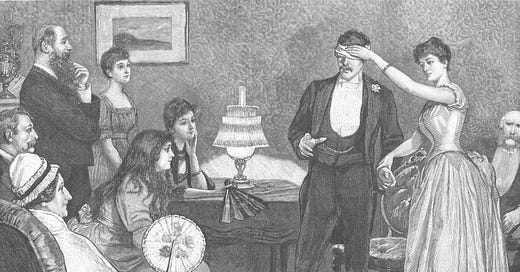I suppose a new era of magical thinking is inevitable once you start chipping away at information safeguards and elevating liars and charlatans to the highest offices of the land. Here we are, actually considering the possibility of installing a renowned anti-vaxxer as our new health secretary — wouldn’t it just follow that someone starts claiming that non-verbal autistic people are telepathic?
This may not have been on your radar, but it’s come on to mine: for a brief moment a few weeks ago, The Telepathy Tapes, a podcast hosted by documentary filmmaker Ky Dickens, overtook noted fascist booster Joe Rogan’s show as the number one podcast in the U.S. It’s currently sitting contented at number seven, just below Pod Save America, but above Jon Stewart and Megyn Kelly.
I’m not a scientist. I’m not a neurologist or a developmental psychologist; I play in a rock band and I write fiction. I am, however, the dad of an autistic person and so I am pretty familiar with the sort of wild magical thinking that can sometimes proliferate through the autism-parent/researcher community. Sometimes that thinking can be dangerous.
The Telepathy Tapes is that kind of magical thinking.
When I learned about this podcast, I was, of course, a bit incredulous. Telepathy, you guys. People talking to one another without speaking; people reading other peoples’ minds. Folks who have, you know, the shine. All from, as the host Dickens puts it, “non-speakers who also have autism.”1
Dickens centers her podcast around a neuropsychiatrist, Dr. Diane Hennecy Powell, who talks blithely about putting her scientific career on the line by studying a handful of cases in which parents claim that they are able to communicate with their non-verbal autistic kid with their minds alone. Not being a scientist myself, I don’t feel super qualified to challenge Dr. Powell’s findings or research but I’m just going to go out on a limb and say that if we are first hearing about telepathy in autistics via a podcast hosted by a documentary filmmaker and not through some rigorously researched and peer-reviewed paper in a credible scientific journal, then I’m calling bullshit. Telepathy, people. The shine.
What I am concerned about, however, is that this kind of thinking can only further the othering of autistic people in general, treating them like they have some kind of magical power, and that can get in the way of real acceptance and accommodations for autistics of all support needs.
I totally get it: being the parent of a kid with a significant disability can be a serious mindfuck. It will alter the course of your life, it will challenge the way you see yourself and the world around you. In the early days of understanding your kid’s disability, it can lead you into some wild spaces. It’s a very vulnerable place to be in — I can totally imagine the desire in parents of non-verbal autistic kids to want to believe telepathy exists. I can imagine that desire being so great, that vulnerability so strong, that you actually see it happening, that you can speak to your child without words and have them speak to you. I get it.
But it’s not real. As far as we know, telepathy is not real2. And my heart goes out to these people for believing it is. However, the sooner they can get to a space where they see their child as a non-magical human, I think, the sooner they can get around to the task of accepting their kid for who they are. When we start seeing magical powers in kids or adults who are puzzling to us, we are avoiding the work of acceptance — and we are potentially setting them apart from other kids or adults in the community, which only creates more barriers to acceptance: “Well, my kid is telepathic — sorry about yours.”
In that sense, it bears a striking similarity to the “Magical Negro” trope — in this case, the “Magical Autistic.” When we fear something or someone or don’t understand them, there is a tendency to want to see them blessed with some kind of otherworldly power, thereby making their condition more palatable or less scary to us. But it only serves to further their otherness — it tries to erase the reality of their condition and makes them, in some ways, less human.
Of course, this isn’t the only potential harm of elevating this pseudo-science — it can dilute the research that is being done on alternative forms of communication. Letterboards and Talkers can be important tools for non-verbal autistic people but their use is still controversial and is continually being studied — adding the potential of telepathy can only interfere with that needed research. Barb Avila, a Portland autism researcher, wrote about that at greater length in a recent blog post.
I do believe that autistic people have a ton to contribute to society and we are only starting to learn about what that is. There’s no doubt that their skills can sometimes even seem super-human — reading entire novels in the span of minutes, rendering a picture-perfect drawing of a city skyline entirely from memory — but they are not magical, folks. They are humans, just like the rest of us, with all the entailing gifts and flaws. We should learn to treat them like that.
“Also have autism” — right off the bat we have a red flag. In my experience, anyone deliberately avoiding identity-first language is not super in touch with the accepted norms of the autism community. Person-first language (“a person with autism”) is so often embraced by the “defeat autism” crowd, the same people who brought us hyperbaric chambers and MMR vaccine boycotts. By and large, the neurodiversity movement has come to prefer identity-first language as a way to show that their autism is inseparable from their personhood.
There is no credible research that suggests that telepathy is real. Does that mean it’s flat out not real? Who knows! There’s so much stuff we don’t understand about the brain and I, for one, would welcome proof of telepathy or astral projection or psychokinesis or whatever. But this ain’t it. I remain telepathy-agnostic.











Thank you.
I spend a lot of time informing my very minimally speaking 4 year old that he *isn’t* telepathic and that while it might seem like I can read his mind, I’m really noticing that he’s hungry/tired/bored because *insert body language here*. I often don’t know how I know what he wants or needs, other than the fact that I’ve spent nearly every moment with him since he came home from the hospital and I know him better than anyone else in the world. I can see how magical thinking could convince me of telepathy, I wish I could live in that delusion sometimes instead of a world of therapies that take up his time that he barely wants to participate in.
I’d love a magical world where we could just read each other’s minds- I’m sure it would make his life much easier & minimise communication related meltdowns!
"When we fear something or someone or don’t understand them, there is a tendency to want to see them blessed with some kind of otherworldly power, thereby making their condition more palatable or less scary to us. But it only serves to further their otherness..." Anyone who doubts the real power of our Jewish space lasers does so at their own risk. :-)
In seriousness, othering is the name of the Trump game. It's going to be a very short time until every single person in this country belongs to a targeted group or is close to someone who does. Claiming that people with autism are telepathic is one step away from denying them needed services because they can communicate if they want to, right?
I know what it feels like to be at the receiving end of othering. And I choose not to use the privileges I do have to scorn the identities that people in our many communties value about themselves. I don't need to assign hateful people to an identity for me to know that they are hateful and dangerous. Their behavior identifies them over and over.